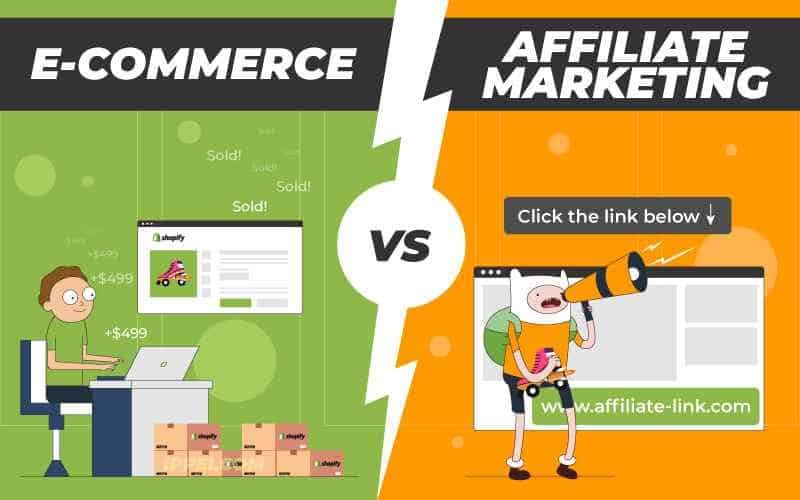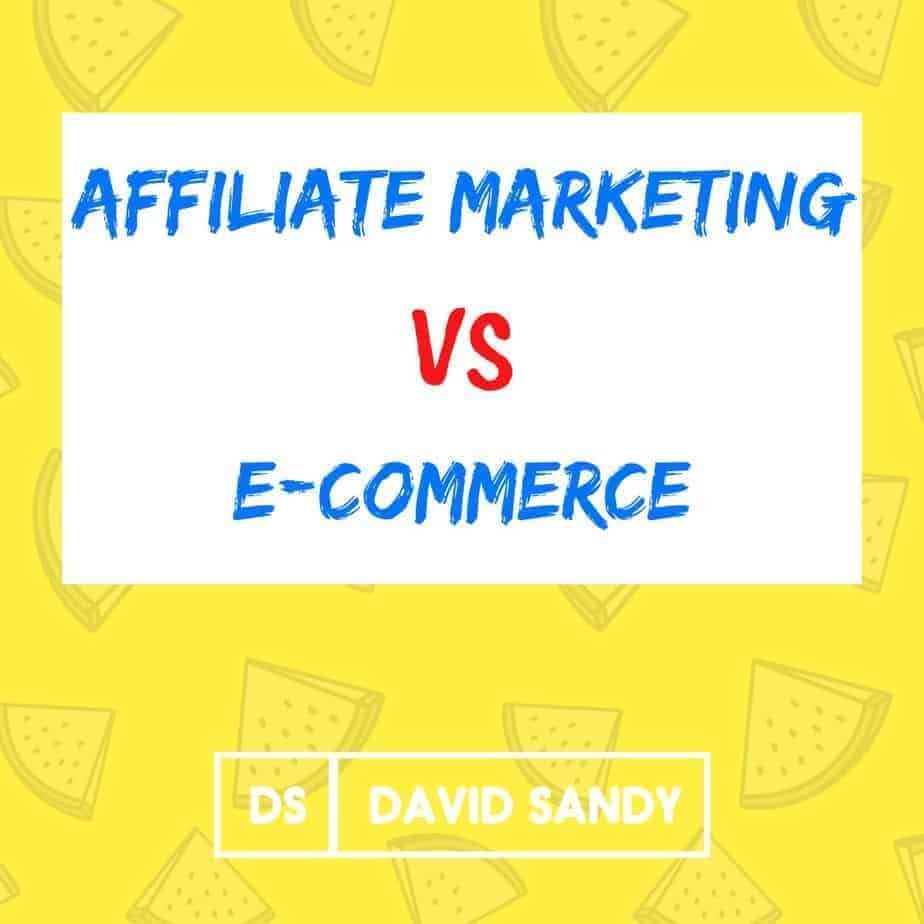As the digital landscape continues to evolve, more and more people are exploring opportunities to earn money online. Two of the most popular options are affiliate marketing and e-commerce. While both offer exciting possibilities, they also require different strategies and skill sets. So, which path is the right one for you? In this comparison article, we will explore the key differences between affiliate marketing and e-commerce, helping you make an informed decision about which route to take. As a seasoned expert in the world of digital marketing, I have experienced both of these avenues firsthand and am eager to share my expertise with you. So, let’s dive in and find out which path is the right one for your online business ambitions.
Affiliate Marketing
| Affiliate Marketing | |
|---|---|
| Definition | When you promote other people’s products and earn a commission for each sale made through your unique affiliate link. |
| Costs | Minimal startup costs, usually no need to create your own product. |
| Marketing Skills Needed | Strong marketing and promotional skills needed to create content that drives traffic to the product via your affiliate link. |
| Payout Percentage | Commission rates are usually lower, ranging from 4-20% of the sale amount. |
| Flexibility | Offers flexibility in terms of the products and niches you can promote, enabling you to reach a wider audience. |
| Scalability | You can easily scale your business by promoting a variety of products across multiple niches. |
| Examples | Amazon Associates, ShareASale, Clickbank, Commission Junction, among others. |
E-commerce
| E-commerce | |
|---|---|
| Definition | The process of buying and selling products online through your own e-commerce website or an established marketplace. |
| Costs | High startup costs, need to create your own product and develop an e-commerce website. |
| Marketing Skills Needed | A strong understanding of marketing and sales concepts is necessary to create effective product listings, drive traffic and sales. |
| Payout Percentage | Full control over product pricing and profit margins, with higher payout percentages for each sale made. |
| Flexibility | Offer less flexibility in terms of the products that can be sold, depending on niche and category. |
| Scalability | Scaling the business is challenging without significant investment due to the need to create more products or expand the product line to capture a larger market. |
| Examples | Amazon, eBay, Shopify, Magento, among others. |

Affiliate Marketing vs. E-commerce: Choosing the Right Path
Affiliate Marketing
Affiliate marketing is a performance-based marketing strategy where an affiliate earns a commission by promoting other people’s or company’s products. The affiliate promotes the product to their audience, who then makes a purchase using the affiliate’s unique link or code.
Pros:
- Low capital investment required
- No need to create own products or handle inventory
- Flexible work hours and location
- No customer service or after-sales support
Cons:
- No control over the product or its price
- Pay reliant on product sale performance
- Strong competition for high-paying affiliate programs
- Risk of fraudulent affiliates or customers
Key Points:
- Affiliate marketing involves promoting other products for a commission
- No product creation or inventory management required
- Pay structure is commission-based
- Flexible work hours and location.
Features:
- Free affiliate marketplace platforms like Amazon Associates, Clickbank, etc.
- High-paying affiliate programs in different niches.
- Tools for tracking leads, clicks, and conversions.
Quantitative measurements:
Affiliate marketing generates approximately 16% of e-commerce orders in North America, with the average affiliate sale being $81.
Reasons to consider:
Affiliate marketing is ideal for those who wish to start a business with little investment. Individuals with exceptional marketing skills can earn a significant income from commissions.
Reasons to ignore:
Affiliate marketing requires considerable effort to establish a reliable stream of commissions. Success depends on the performance of the product being promoted and external factors like Google algorithms.
Suggestions to potential buyers:
Join reputable affiliate programs, and learn the proper marketing techniques to reach your target audience. Building a loyal following of customers takes time and patience.
E-commerce
E-commerce refers to the buying and selling of goods and services online. It is a business model that eliminates the need for a physical storefront and allows businesses to reach customers globally.
Pros:
- Direct control over products, pricing, and branding
- Scalability and growth opportunities
- Multiple payment and shipping options
- Customer data and analytics available
Cons:
- Significant investment required for inventory, website development, and marketing
- High competition and threat from established e-commerce businesses
- Need to handle customer service, returns, and after-sales support
- Security and privacy concerns for both customers and business
Key Points:
- E-commerce refers to selling goods and services online through a platform or website
- Business has direct control over branding, products, pricing, and customer experience
- Much upfront investment is required
- Business needs to handle customer service, shipping, and returns
Features:
- Full control over branding, products, pricing, and customer experience
- Multiple payment and shipping options
- Access to customer data and analytics
- Scalability and growth opportunities
Quantitative measurements:
E-commerce sales were responsible for approximately 21.3% of all retail sales worldwide in 2020, with expected growth to $6.54trillion by 2022.
Reasons to consider:
E-commerce provides scalability and control over every aspect of the business, from branding and product development to shipping and customer experience. It is suitable for those who are ready to make a significant investment and willing to handle customer service.
Reasons to ignore:
E-commerce requires a considerable upfront investment, making it challenging for small businesses. Competition is of utmost concern, given the market dominance of established e-commerce businesses.
Suggestions to potential buyers:
Learn industry best practices when setting up your e-commerce website. Focus on creating a compelling customer experience, from browsing to post-sale follow-up. Ensure proper cybersecurity measures and follow regulatory guidelines to maintain customer trust.

Guidelines for Using Affiliate Marketing vs. E-commerce: Choosing the Right Path
Understanding the Differences
Before choosing between affiliate marketing and e-commerce, it’s crucial to understand their unique functionalities. Affiliate marketing relies on partnerships where publishers promote a product or service and earn a commission on every sale made through their referral. In contrast, e-commerce involves brands selling products or services directly to customers through their own website or platform.
Identifying Your Goals
The path you choose should align with your overall business goals. If you want to increase brand awareness and expand your reach, affiliate marketing may be the right choice. If you want to have more control over the shopping experience and customer data, e-commerce may be a better fit.
Considering Your Budget
Cost is also a determining factor in deciding between affiliate marketing and e-commerce. While e-commerce requires investment in website development, marketing, and logistics, affiliate marketing can have lower upfront costs since partners handle the promotion and sales process.
Choosing the Right Platform
Choosing the right platform is crucial for success in both affiliate marketing and e-commerce. In affiliate marketing, platforms like ShareASale and Rakuten offer access to a network of publishers and tools for managing partnerships. In e-commerce, platforms like Shopify and WooCommerce provide website building and hosting services along with features for managing sales and inventory.
How To Choose Between Affiliate Marketing and E-commerce
1. How do I determine if affiliate marketing or e-commerce is the right fit for my business?
Answer: Consider your product or service, target audience, budget, and marketing goals. Affiliate marketing may work better for digital or informational products, while e-commerce is better suited for physical or tangible goods.
2. How do I set up an affiliate marketing program?
Answer: Choose a reliable affiliate platform, create an affiliate agreement, set commission rates, and promote your program to potential affiliates through social media, email marketing or advertising.
3. How do I start an e-commerce business?
Answer: Choose a niche market, research your target audience, secure a domain name, select a website builder, set up payment gateways, and launch your site. Also, consider advertising and promoting your e-commerce business to drive traffic and sales.
4. How can I measure the success of my affiliate marketing or e-commerce business?
Answer: Use web analytics tools such as Google Analytics to track your website traffic, conversion rates, and revenue. In affiliate marketing, monitor your referrals and commission payouts. In e-commerce, track your total sales, average order value and customer lifetime value.
5. How can I improve my affiliate marketing or e-commerce strategy?
Answer: Continuously experiment with different marketing strategies, explore new technologies such as data analytics or artificial intelligence, learn from your competitors, and stay up to date on industry trends and best practices.
FAQs for Affiliate Marketing vs. E-commerce: Choosing the Right Path
1. What is the main difference between affiliate marketing and e-commerce?
While e-commerce involves selling products directly to customers through an online store, affiliate marketing involves promoting products on behalf of a merchant and earning a commission on any resulting sales. Essentially, e-commerce is a form of direct selling while affiliate marketing involves indirect selling.
2. Which path is more profitable: affiliate marketing or e-commerce?
There is no one-size-fits-all answer to this question as profitability depends on many factors, including the marketing strategy, niche, and competition. In general, e-commerce has the potential for greater profits as the seller controls the pricing and profit margin. However, affiliate marketing can also be lucrative, especially for those with a large and engaged audience.
3. What are the pros and cons of affiliate marketing?
Pros: No inventory or shipping responsibilities; minimal capital investment required to start; ability to promote a wide range of products and services; flexible work hours; passive income potential.
Cons: Reliance on the merchant’s product quality and sales funnel; commission rates may be lower than profit margins in e-commerce; lack of control over pricing and customer experience; may require a significant amount of time and effort to build an audience.
4. What are the pros and cons of e-commerce?
Pros: Control over product pricing and profit margins; ability to build customer loyalty through unique branding and customer experience; more direct control over customer service and product quality; higher profit potential.
Cons: Significant capital investment required to start; higher risk and responsibility; need to manage inventory, shipping, and customer service; potential for competition from large e-commerce platforms.
5. Can I use both affiliate marketing and e-commerce together?
Absolutely! In fact, many successful businesses utilize both affiliate marketing and e-commerce as part of their marketing strategy. For example, an e-commerce store may use affiliate marketing to promote complementary products or services that they do not sell directly. Similarly, an affiliate marketer may also sell their own products to their audience, combining both strategies for maximum profitability.
In conclusion, choosing between affiliate marketing and e-commerce ultimately depends on individual preferences and goals. While affiliate marketing offers low start-up costs and low maintenance, e-commerce allows for more control and flexibility in terms of product offerings and branding. Both have their advantages and drawbacks, and it’s important to consider all factors before making a decision.
In this article, we’ve highlighted the main differences between affiliate marketing and e-commerce, and offered insights on how to navigate through the pros and cons of each. Remember that success in either field requires dedication, hard work, and a willingness to adapt to changing market trends.
Our final recommendation is to assess your strengths and resources, and weigh them against the demands of each path. Take the time to research and educate yourself on the ins and outs of affiliate marketing and e-commerce, and make a choice that aligns with your vision and goals. Whatever path you choose, we wish you all the best in your entrepreneurial endeavors!